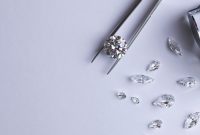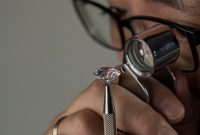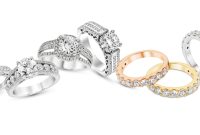Cut
Of the 4Cs, a diamond’s cut has the greatest influence on its sparkle and brilliance. Cut not only refers to shape of a diamond, but more importantly to its proportions. When assessing a raw diamond, an experienced diamond cutter with determine which shape best suits the stone. The shape chosen determines the number of facets a finished diamond will have. Light reflects through the facets producing its brilliance.
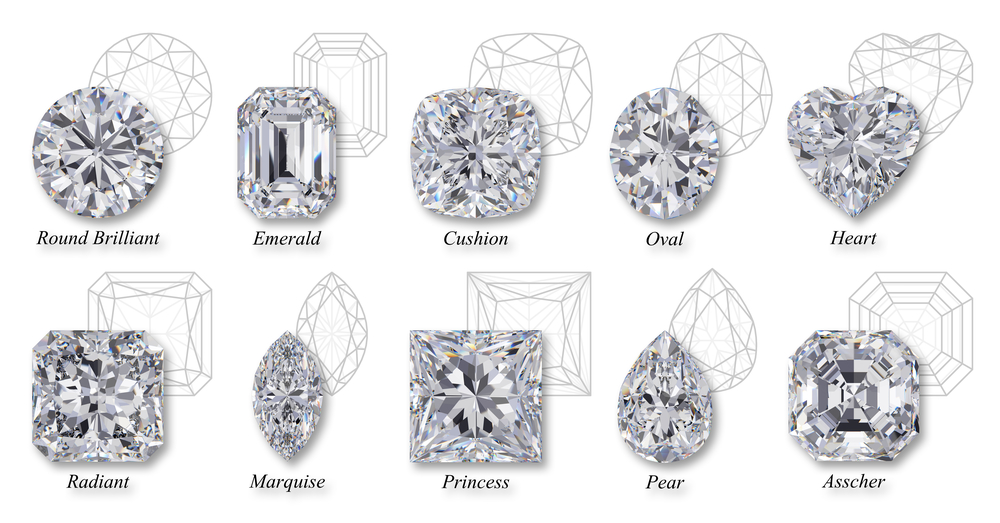
The proportions and finish grade of a diamond establish the quality of the cut. A good finish grade testifies to the workmanship of the diamond polisher. It refers to the symmetry of the facets and their overall finish. The best cut diamonds also have the right proportions between the different parts of the diamond. If these proportions are not optimal, the fire and brilliancy of the diamond are affected, and undesirable visual effects might occur.

In the simplest representation, a modern diamond has three main parts. The top of the diamond is called the crown and the bottom is called the pavilion. The part that separates the crown and pavilion is called the girdle. The flat part on top of the diamond is the table, which is the largest facet. The culet is a tiny facet at the very bottom of the pavilion. If the pavilion comes to a point at the bottom, the diamond does not have a culet.
The brilliance of a diamond is caused by the light reflecting off the internal facets of a diamond. Therefore the proportions of a cut have a significant impact on the brilliance. This does not purely refer to the width and depth, rather the proportions, angles and measurements.

Today’s modern brilliant diamond is precisely cut to maximize the diamond’s “fire”, which is the play of light that reflects off the stone’s facets. When grading the cut of a modern diamond, one must consider several characteristics: table size, crown angle, pavilion depth, girdle thickness, as well as polish and symmetry.
Antique Diamonds
When judging diamonds in antique jewellery, one must be careful not to judge antique diamonds by modern standards. Antique diamonds have a soft romantic glow that many people find very appealing. Antique diamonds typically have smaller tables, higher crowns, deeper pavilions and thicker girdles than their modern counterparts. Antique diamonds were cut to maximize carat weight, not “fire”. That’s why the proportions of old diamonds are quite different from their modern counterparts
Diamonds were cut by hand until the early 1900’s. This was a laborious, time-consuming process. Unfortunately, many antique diamonds have been re-cut with modern cutting techniques. This has caused demand for these old cut diamonds to soar in recent years, along with the prices that people are willing to pay for them.
Rose Cut
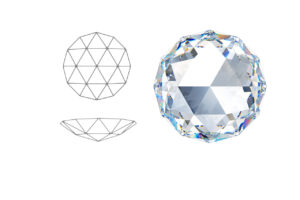
Rose cut diamonds were introduced as early as the 1500’s and were popular until the early 1900’s. The shape of a rose cut diamond resembles the petals of a rose bud. The bottom is flat. The crown is domed shaped and the facets meet in a point in the centre. The number of facets varies from 3,6,12,18,to 24 facets.
Old Mine
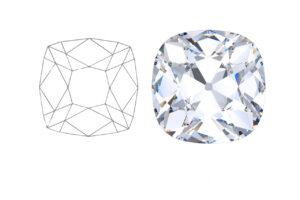 The old mine cut diamond is the earliest form of the modern brilliant cut. Also called the “cushion cut”, it has a cushioned shaped girdle. This cut of diamond is characterized by a high crown, small table, deep pavilion and large culet. Other names for this cut are: old miner, peruzzi cut, and triple cut brilliant.
The old mine cut diamond is the earliest form of the modern brilliant cut. Also called the “cushion cut”, it has a cushioned shaped girdle. This cut of diamond is characterized by a high crown, small table, deep pavilion and large culet. Other names for this cut are: old miner, peruzzi cut, and triple cut brilliant.Old European
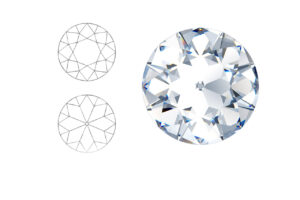 The old European diamond has a very small table, a heavy crown, and great overall depth. This diamond cut was the fore-runner of the modern brilliant cut. Like the modern round brilliant, the old European diamond has a circular girdle.
The old European diamond has a very small table, a heavy crown, and great overall depth. This diamond cut was the fore-runner of the modern brilliant cut. Like the modern round brilliant, the old European diamond has a circular girdle.
Single cut
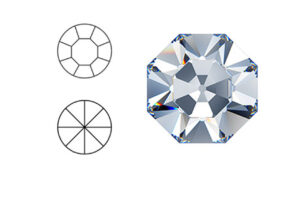 The single cut diamond has an octagonal girdle, a table, eight bezel (or crown) facets, and 8 pavilion facets. It may or may not have a culet.
The single cut diamond has an octagonal girdle, a table, eight bezel (or crown) facets, and 8 pavilion facets. It may or may not have a culet.

